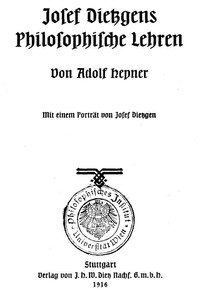Josef Dietzgens philosophische Lehren by Adolf Hepner
"Josef Dietzgens philosophische Lehren" by Adolf Hepner is a philosophical treatise written in the early 20th century. The work explores the ideas of Josef Dietzgen, focusing on his contributions to monistic philosophy, the nature of human thought, and his critical perspective on prior philosophical traditions. Hepner aims to present Dietzgen's theories in an accessible manner, highlighting their relevance to contemporary philosophical discourse. The opening of the text introduces the complex landscape of
philosophy, suggesting that not all philosophical ideas have enduring merit and that clarity of expression is often lacking among philosophers. Hepner conveys that Dietzgen's approach, particularly in his major work "Das Wesen der menschlichen Kopfarbeit" (The Nature of Human Thought), seeks to uncover the fundamental nature of the thinking process. It criticizes past philosophical frameworks, particularly those of Kant and Hegel, asserting that true understanding arises from experience rather than abstract speculation. The introductory section sets the stage for a deeper exploration of Dietzgen's monistic epistemology, which aims to bridge the gaps between thought and reality while emphasizing the importance of practical experience in acquiring knowledge. (This is an automatically generated summary.)
Read or download for free
| How to read | Url | Size | |||
|---|---|---|---|---|---|
| Read now! | https://www.gutenberg.org/ebooks/50574.html.images | 411 kB | |||
| EPUB3 (E-readers incl. Send-to-Kindle) | https://www.gutenberg.org/ebooks/50574.epub3.images | 290 kB | |||
| EPUB (older E-readers) | https://www.gutenberg.org/ebooks/50574.epub.images | 289 kB | |||
| EPUB (no images, older E-readers) | https://www.gutenberg.org/ebooks/50574.epub.noimages | 222 kB | |||
| Kindle | https://www.gutenberg.org/ebooks/50574.kf8.images | 402 kB | |||
| older Kindles | https://www.gutenberg.org/ebooks/50574.kindle.images | 366 kB | |||
| Plain Text UTF-8 | https://www.gutenberg.org/ebooks/50574.txt.utf-8 | 371 kB | |||
| Download HTML (zip) | https://www.gutenberg.org/cache/epub/50574/pg50574-h.zip | 248 kB | |||
| There may be more files related to this item. | |||||
Similar Books
About this eBook
| Author | Hepner, Adolf, 1846-1923 |
|---|---|
| Title | Josef Dietzgens philosophische Lehren |
| Note | Reading ease score: 57.7 (10th to 12th grade). Somewhat difficult to read. |
| Credits |
Produced by Alexander Bauer and the Online Distributed Proofreading Team at http://www.pgdp.net |
| Language | German |
| LoC Class | B: Philosophy, Psychology, Religion |
| Subject | Philosophy |
| Subject | Dietzgen, Joseph, 1828-1888 -- Criticism and interpretation |
| Category | Text |
| EBook-No. | 50574 |
| Release Date | Nov 29, 2015 |
| Copyright Status | Public domain in the USA. |
| Downloads | 111 downloads in the last 30 days. |
| Project Gutenberg eBooks are always free! | |


